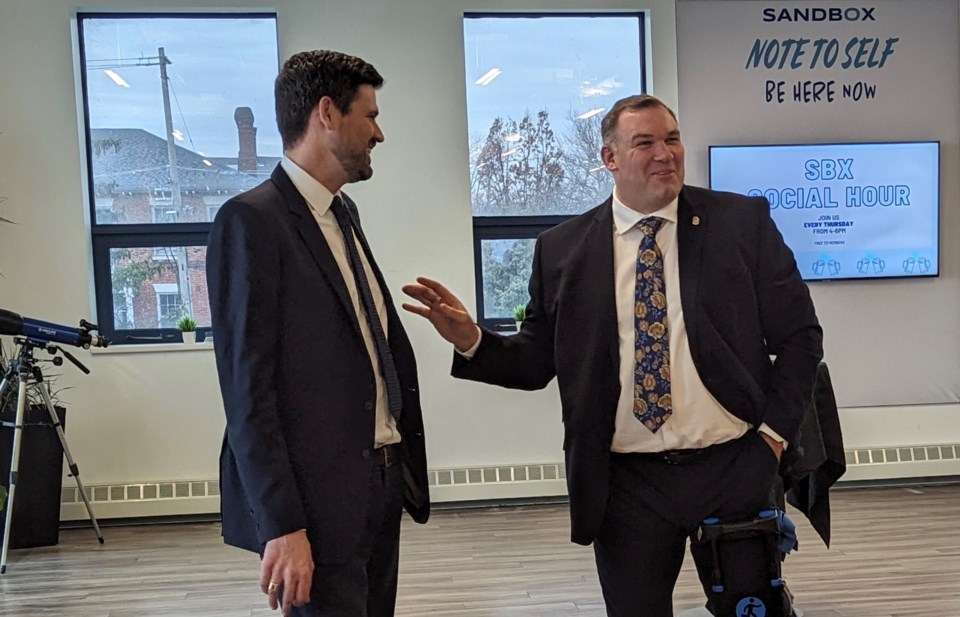How many ways can $25.7 million be sliced?
Barrie will find out during the next three years or so.
On March 14 the city received $25.7 million in federal funding to both fast-track more than 680 housing units in the next three years and help spur construction of 4,100 homes during the next decade.
The housing accelerator fund (HAF) will provide money designed to eliminate barriers to building needed housing.
Barrie’s plan commits to nine local initiatives such as permitting four units as-of-right citywide, making city-owned lands available for affordable housing, helping stalled developments that already have planning approvals get building permits by offering incentives, and expanding the city’s affordable housing community improvement plan to include forgivable loans for secondary suites.
Michelle Banfield, the city’s executive director of development services, said the estimate to complete all of the city’s initiatives is less than the HAF grant.
“As a start, staff and council will be prioritizing the initiatives based on the ones that will get more homes, built faster,” she said. “Staff will be making recommendations to council on how best to allocate the HAF.”
The city has to report to the federal government, on an annual basis, specifically how the HAF money is spent.
Any remaining HAF money can be allocated for investments in affordable housing, along with the construction, repair or modernization of land or building acquisitions for affordable housing.
Also on the list are investments in housing-related infrastructure, drinking water and wastewater infrastructure, solid waste management, public transit, community energy systems, disaster mitigation, brownfield redevelopment, broadband and connectivity and capacity building that supports housing, along with site preparation for housing developments.
Banfield said there is no requirement that the city spend all of the HAF grant within three years.
City funding is unlikely to be used to pay for the nine initiatives.
“Other than where there may be some previously approved expenditures in the annual capital budget, no additional city funding is anticipated to be used for the initiatives,” Banfield said.
The city is already ahead of the game with the nine initiatives.
Last week council changed the city’s zoning bylaw to permit as many as four residences on one property.
Council also instructed staff to investigate the removal of development charges (DCs) on fourth units in the Salem and Hewitt’s secondary plan areas in south Barrie for approved, proposed and future draft plans of subdivision areas, where building permits have not been issued for construction, and report back to affordability committee — subject the Ontario minister of municipal affairs and housing’s approval.
Development charges are designed to recover the capital costs associated with residential and non-residential growth within a municipality, from developers, so that existing residents don’t have to foot the bill.
And earlier this year, public meetings were held on rezoning applications to potentially turn city owned land into hundreds of new residences. Council made three parcels of land surplus to its needs, to be rezoned for residential use and sold for the development of 1,375 new units.
The properties are 29 and 35 Sperling Dr., Barrie’s former police headquarters, 50 Worsley St., known as the H-Block and 48 Dean Ave., right beside Barrie Public Library’s Painswick branch.
As for the remainder of the nine initiatives, the HAF money will pay for a variety of methods to help home construction.
This includes better management of documents, implementing mobile inspections for building inspectors and implementing a system to allow the entire development and building permit process to be handled electronically, including the payment of required fees.
There will be partnering with non-profit organizations which have concept plans for affordable housing, to assist them with obtaining building permits, and better communication with developers which have approved but unbuilt projects.
Barrie’s new, comprehensive zoning bylaw is to encourage affordable and ‘missing middle’ units, or a lack of medium density housing.
Better assessing available capacity and potentially reducing engineering requirements for each development application and streamlining the city’s permit process, which can include additional staffing and longer hours of operations, are also initiatives.



